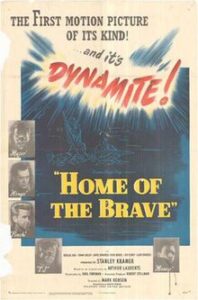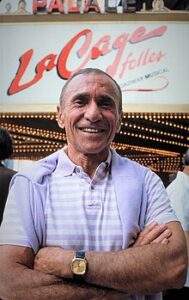Home of the Brave **** (1949, Frank Lovejoy, Lloyd Bridges, Douglas Dick, James Edwards, Steve Brodie, Jeff Corey, Cliff Clark) – Classic Movie Review 12,021
Director Mark Robson’s 1949 Stanley Kramer Productions black and white war film Home of the Brave is based on a 1946 play by Arthur Laurents, and stars Frank Lovejoy, Lloyd Bridges, Douglas Dick, James Edwards, Steve Brodie, Jeff Corey, and Cliff Clark. The film is about prejudice. It could be anti-Semitic as it was in the original play, anti-gay as the gay playwright Laurents might have had in mind when he wrote it, or anti-black as it became in the film.
Laurents was surprised when he sold the rights to Hollywood to be told that his main character was to be turned from Jewish into black because ‘Jews have been done’. Obviously gays had not ‘been done’ yet, as it was a totally taboo subject in Hollywood. What were the first steps? Certainly not Rope (1948). Tea and Sympathy (1956) perhaps. Anyway, authors and gays are the last cabs off the rank.
Home of the Brave is a milestone. This notable, honourable early film about the scourge of anti-black racist prejudice is one of Hollywood’s first, tentative attempts to focus on America’s troubled race relations.
A black soldier (James Edwards), who becomes paralysed through shock, narrates his story to an Army psychiatrist (Jeff Corey) about how he suffered racist abuse from his World War Two army buddies, particularly the bigoted corporal (Steve Brodie), on a mission on a South Pacific Japanese-held island.
Its intriguing, quite challenging story about prejudice may perhaps lack today’s freshness and vigour, but it is still capable of keeping audiences to attention with an intelligent story and a historical perspective on a serious issue. Robert De Grasse’s black and white cinematography is notable and Dimitri Tiomkin’s score is distinguished.
There is a wealth of good acting, especially from James Edwards as Private Peter Moss, Lloyd Bridges as his lifelong buddy Finch, Douglas Dick as the major and Frank Loveloy as the sergeant. But there is disappointingly uncinematic filming by director Robson of a stage play (by Arthur Laurents) that was actually about anti-Semitism, with the protagonist being Jewish, rather than black.
It is Bridges’s first starring role in a major movie.
The film cost of $525,000 was completed in 30 days, using three different units at the same time. It is mostly made on indoor sets, but the climax is shot on Malibu beach with a former navy PT boat. Associate producer Robert Stillman and his father financed the film rather than borrowing from banks. This risk paid off, with $2.5 million earned at the box office.
The title comes from the last line of the ‘Star Spangled Banner’.
Arthur Laurents was drafted into the US Army and spent World War Two with the Army Pictorial Service located in a film studio in Astoria, Queens, where he wrote training films. After his discharge, he wrote Home of the Brave, drama about anti-Semitism in the military, in nine consecutive nights, inspired by a photograph of GIs in a South Pacific jungle. It ran for 69 performances on Broadway from 27 December 1945.
Much later Laurents learned he officially had been blacklisted, mainly because a review of Home of the Brave had been published in the Daily Worker.
In his 2000 memoirs, Laurents recalled his many gay relationships, including those with Farley Granger and Tom Hatcher. It’s good to have friends, especially if they are members of the fame club. Laurents’s friend Gore Vidal suggested he seek out aspiring actor Hatcher at the Beverly Hills men’s clothes store he was managing. Laurents and Hatcher remained together for 52 years until Hatcher’s death on October 26, 2006.
Laurents’s film scripts include Rope (1948), which starred his then-lover Granger. Laurents needed to make the audience aware that the three main characters were gay without saying so. The Hays Office kept close watch on his script, which was so discreet that Laurents was unsure whether star James Stewart realised his character was gay.
Bridges admitted to the House Un-American Activities Committee in the early 1950s that he had been a member of the Actors’ Laboratory Theatre, a group with links to the Communist party, and was briefly blacklisted. But he recanted his membership, became a cooperative witness for the House Un-American Activities Committee, and returned to acting.
Independent producer Stanley Kramer (September 29, 1913 – February 19, 2001) made many of Hollywood’s most famous message movies tackling topical social issues that the studios avoided, especially racism (in Home of the Brave, The Defiant Ones and Guess Who’s Coming to Dinner),
Home of the Brave is directed by Mark Robson, runs 87 minutes, is made by Stanley Kramer Productions and Screen Plays, is released by United Artists, is written by Carl Foreman, is shot in black and white by Robert de Grasse, is produced by Stanley Kramer, is scored by Dimitri Tiomkin, and is designed by Rudolph Sternad.
© Derek Winnert 2022 Classic Movie Review 12,021
Check out more reviews on http://derekwinnert.com



